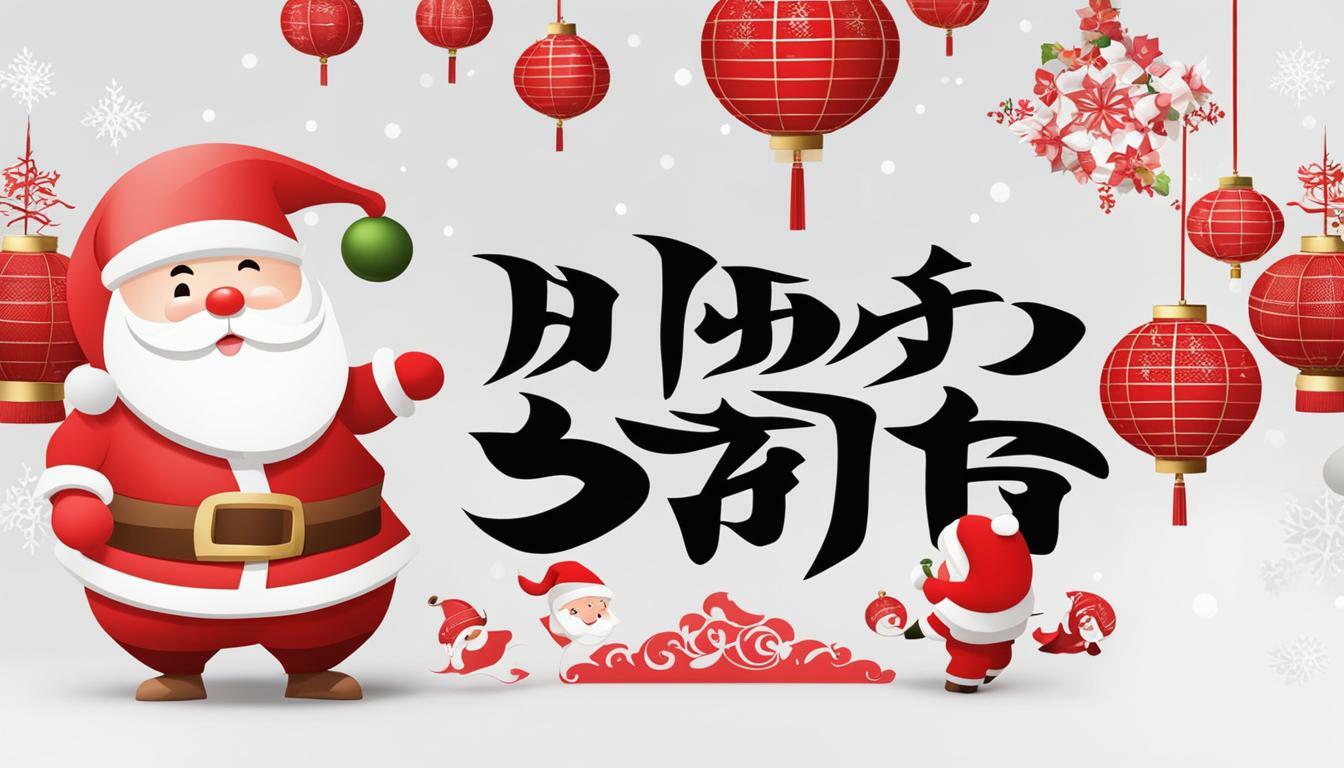Are you curious about how to say Santa Claus in Japanese? Whether you’re learning the language for fun or planning a trip to Japan during the festive season, it’s always helpful to expand your language skills. In this section, we will explore various ways to say Santa Claus in Japanese and provide you with language tips to impress others with your knowledge.
The Japanese word for Santa Claus is “サンタクロース,” which is a direct translation of the English word. It’s widely recognized by Japanese speakers, especially during Christmas time. But how do you pronounce it correctly? Break it down into syllables: “sa-n-ta-ku-ro-su” and practice saying it aloud to perfect the pronunciation.
It’s interesting to note that in Japan, Santa Claus is often depicted as a figure dressed in red clothing, similar to the Western image. However, there are also cultural variations, such as “Hoteiosho,” a Japanese deity who bears gifts and shares similarities with Santa Claus. Exploring these cultural references can deepen your understanding of the Japanese perspective on Christmas.
Now that you know how to say Santa Claus in Japanese and have learned more about cultural references, why not expand your language skills further? Dive into more festive vocabulary, practice speaking with native Japanese speakers, or explore other languages spoken during the holiday season. Embrace the multicultural aspect of the festive season and celebrate the joy of language learning.
The Japanese Word for Santa Claus
Santa Claus is a beloved figure during the Christmas season, and in Japan, he is commonly known as “サンタクロース” or “Santa Kurōsu.” This term is a direct translation of the English word, and it is widely recognized by Japanese speakers, especially during Christmas time.
If you want to impress your Japanese friends, you can use the Japanese word for Santa Claus and show off your language skills.
| English | Japanese |
|---|---|
| Santa Claus | サンタクロース |
| Father Christmas | サンタクロース |
| St. Nick | サンタ |
As you can see, “サンタクロース” is the most common and recognizable term for Santa Claus in Japan.
How to Pronounce Santa Claus in Japanese
If you’re interested in learning how to say Santa Claus in Japanese, it’s essential to know how to pronounce it correctly. In the Japanese language, Santa Claus is known as “サンタクロース,” which is pronounced as “sa-n-ta-ku-ro-su.”
Breaking the word down into syllables can help you master the pronunciation. Repeat after this guide: “sa” (like in “sun”), “n” (like in “no”), “ta” (like in “taught”), “ku” (like in “cool”), “ro” (like in “row”), and “su” (like in “sue”).
Make sure to pronounce each syllable clearly and distinctly. Practice saying the word aloud until you can say it fluently.
Remember, “サンタクロース” is the proper Japanese term for Santa Claus. Knowing how to say it correctly can help you communicate more effectively with Japanese speakers during the festive season.
Cultural References to Santa Claus in Japan
In Japan, Santa Claus is a well-known figure during the festive season. Known as “サンタクロース” in Japanese, Santa Claus is often depicted wearing the traditional red clothing, similar to the Western image. However, there are also cultural variations, such as “Hoteiosho,” a Japanese deity who bears gifts and shares similarities with Santa Claus.
The image of Hoteiosho is similar to that of Santa Claus, with a white beard and red clothing. However, instead of a sleigh and reindeer, Hoteiosho rides a deer. The deity also has a different backstory, being associated with good fortune and happiness rather than the Christian story of Christmas.
Japanese Equivalent for Santa Claus
While “サンタクロース” is the most common Japanese term for Santa Claus, there are also regional variations. In some parts of Japan, he is referred to as “聖者様” (Seija-sama) or “仙人様” (Sennin-sama), which can translate to “holy person” or “wise man.”
Understanding these cultural references can deepen your appreciation of the Japanese perspective on Christmas. It’s a reminder that the festive season can be celebrated in different ways around the world.
Enhancing Your Language Skills this Festive Season
Now that you’ve mastered how to say Santa Claus in Japanese, why not take your language skills further? Expand your vocabulary and learn new ways to express your festive spirit in Japanese.
Start by exploring other Christmas-related words and phrases, such as “メリークリスマス” (merii kurisumasu) for “Merry Christmas” or “クリスマスツリー” (kurisumasu tsurii) for “Christmas tree”.
Practice speaking with native Japanese speakers to improve your pronunciation and fluency. Join language exchange programs or conversation groups to connect with other language learners and practice speaking in a casual environment.
If you’re feeling ambitious, why not explore other languages spoken during the holiday season? Learn how to say “Feliz Navidad” in Spanish, “Joyeux Noël” in French, or “Frohe Weihnachten” in German. Embrace the multicultural aspect of the festive season and celebrate the joy of language learning.
Regardless of your language level, the festive season is the perfect time to practice and improve your skills. So, go ahead and spread some cheer by saying “メリークリスマス” and “サンタクロース” with confidence this holiday season.
FAQ
Q: What is the Japanese word for Santa Claus?
A: The Japanese word for Santa Claus is “サンタクロース” (San-ta-ku-ro-su).
Q: How do you pronounce Santa Claus in Japanese?
A: To pronounce “サンタクロース” in Japanese, break it down into syllables as “sa-n-ta-ku-ro-su” and pronounce each syllable clearly.
Q: Are there any cultural variations of Santa Claus in Japan?
A: Yes, in addition to the Western image of Santa Claus, Japan also has cultural references such as “Hoteiosho,” a deity that shares similarities with Santa Claus.
Q: How can I enhance my language skills this festive season?
A: Besides learning how to say Santa Claus in Japanese, you can explore more festive vocabulary, practice speaking with native Japanese speakers, or even explore other languages spoken during the holiday season to embrace the multicultural aspect of the festive season and celebrate the joy of language learning.

